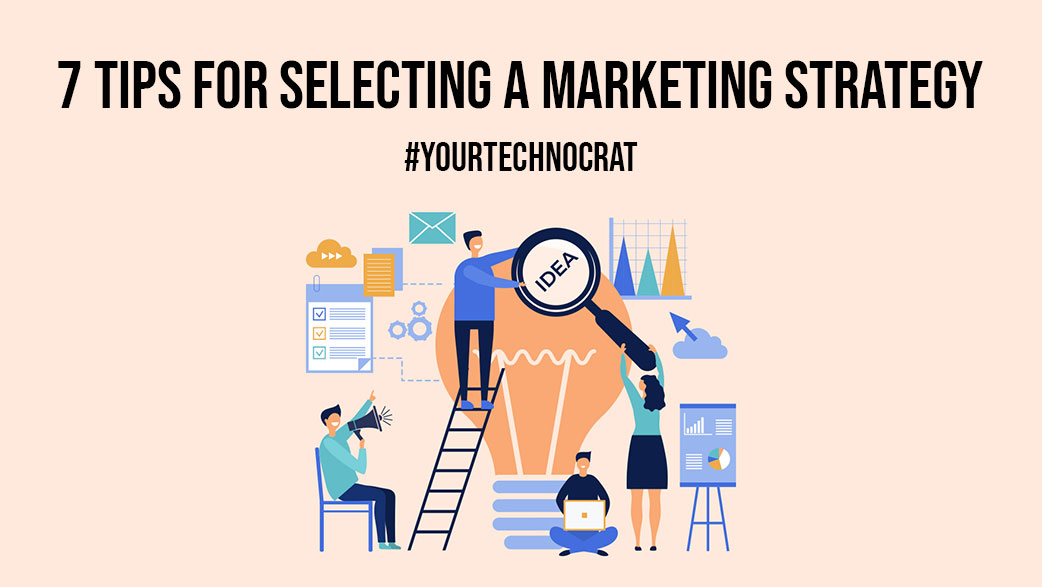A marketing strategy is an action plan tailored to appeal to a particular group or market in order to generate sales. It is an element of your business’s marketing plan, and it helps you decide where and how you will market your company or product.

In this article, we’ve gathered the most important tips for choosing the right strategy for your business.
This is not a complete list; there are numerous other things that go into choosing the perfect strategy depending on your company’s needs and goals.
Table of Contents
Find a Marketing Strategy That Fits You
When starting your business, you’re probably going to have an idea of the type of product or service you want to offer, but it’s still important to consider the industry in which you want to operate.
Carefully evaluate what other businesses in your industry are doing, and then evaluate whether or not any of those strategies would fit into your current business plans.
Choose a Market Segment
Part of choosing a marketing strategy means choosing who you’re going to target with your products or services. If you’re looking to attract a wide range of customers, you may want to make sure that you have a large enough customer base before embarking on your marketing efforts.
If you want to be more targeted, select a smaller market segment (such as women over 45) so that your products or services are aimed at those people specifically.
Once you’ve decided on the size of your target market, consider what kind of message you’d like to use in order to attract them.
Also Read: Effective Digital Marketing Efforts
Identify Your Target Audience
Figure out your target audience by gathering information about the market and then narrowing it down as much as possible.
Online surveys are a great tool for finding out more about your target market, and you can use that information to create an effective marketing strategy.
Use the information you’ve gathered about your target audience to help inform what they want when it comes to your business or product.
Consider their needs and wants in order to create an effective marketing campaign that will make them want to buy what you’re offering. Also, consider how they perceive other products that are similar to yours.
Determine Your Goals For Your Marketing Strategy
Goals should be your foundation when it comes to building a good marketing strategy, and once you have them figured out, you can start creating a plan of action to reach those goals.
Goals can easily be divided into two categories: short-term and long-term goals.
Your short-term goals are usually promotional in nature, while long-term ones are usually more strategic in nature.
Short-term and long-term should be clearly defined for your marketing strategy as well, so don’t try to simply guess at what kind of marketing strategy will get you where you want to go.
Long-term goals, like good SEO, should be specifically tailored to what your business does.
For most long-term goals, you may want to consult professionals. Professional marketers and SEO experts will be worth the money you spend on them if they can help your business grow.
Create Your Marketing Strategy
Now that you’ve given careful consideration to all of the factors that go into a good marketing strategy, you can now begin creating an action plan for using those strategies to reach your goals.
Start with the short-term goals and then focus on reaching them through strategies that will help you achieve your long-term goals, which are strategically driven.
When it comes time for you to implement your new marketing strategy, you’ll want to ensure that it’s highly targeted so as not to waste valuable time and energy trying to market your product or service when the target audience isn’t interested.
Consider The Return On Investment
The return on investment (ROI) is an important factor to consider when opting for a marketing strategy.
How much money do you expect to be generated by your strategy? How much of a rise in revenue are you expecting?
You should consider the amount of time spent preparing for and implementing your marketing strategy, as well as any hidden costs that might not become visible until further down the line.
Aim High
When first creating your marketing strategy, it’s best to set very high goals. Setting yourself up for failure is unnecessary if you’re going after a big prize.
If you’re focused on accomplishing long-term goals, you’ll have much better chances of succeeding if you set a high goal and then work hard to achieve it.
Also Read: Digital Marketing Strategies For Small Businesses
Create Your Budget
Now that your marketing strategy has been created and is in place, it’s time to put a price on the whole thing.
Set a budget for how much money you need to spend on your marketing strategy, and then come up with a flexible plan to reach those goals.
It may be necessary for you to invest more than the average amount in order for your plan to go smoothly, so don’t let this discourage you from preparing for success.
Leave a Reply